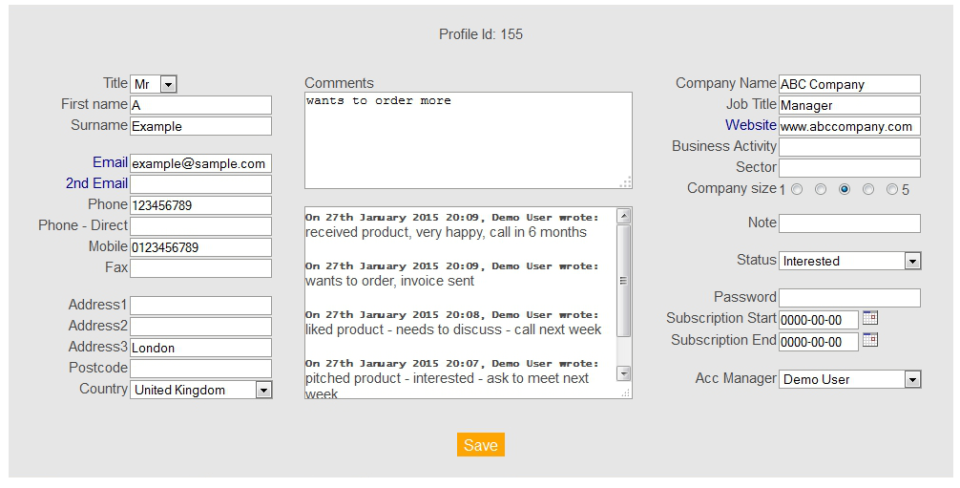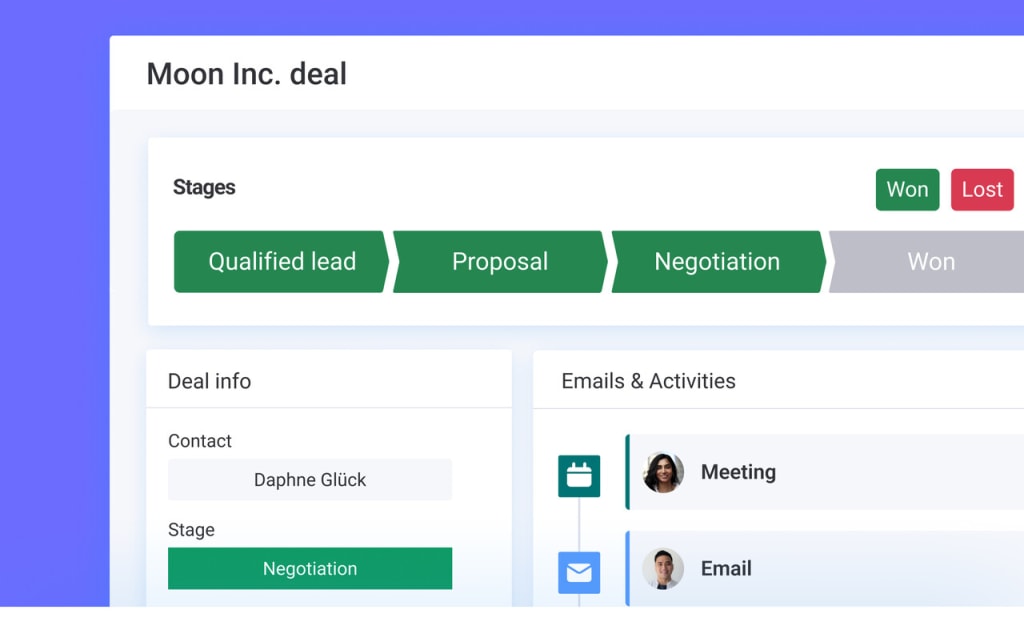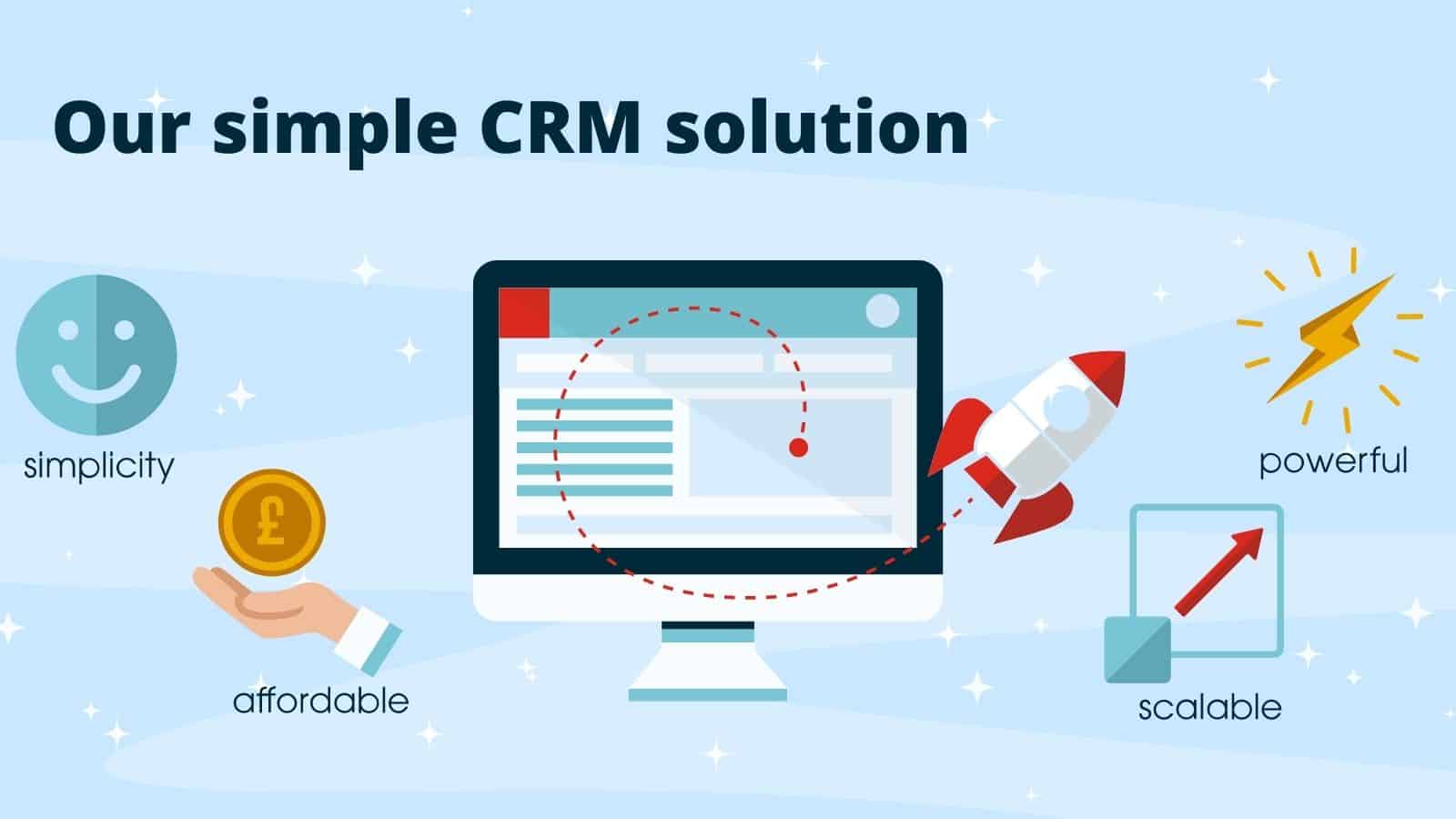Crm simple – Introducing CRM simplicity, a revolutionary approach to customer relationship management that empowers businesses with a user-friendly and efficient solution. This streamlined system eliminates complexity, enhancing productivity, and fostering seamless interactions with your valued customers.
Delve into the world of CRM simplicity, where businesses unlock the power of intuitive software, tailored to their unique needs. Discover the key benefits, essential features, and best practices for implementing a simple CRM system that will transform your customer relationships.
Defining CRM Simplicity

CRM simplicity refers to the ease of use, implementation, and maintenance of a customer relationship management (CRM) system. A simple CRM system is designed to streamline business processes, improve collaboration, and enhance customer interactions without overwhelming users with excessive complexity.
The benefits of CRM simplicity include increased user adoption, improved data quality, reduced training time, and enhanced productivity. By simplifying the CRM system, businesses can empower their teams to focus on building strong customer relationships rather than struggling with complex software.
Key Features of a Simple CRM System
- Intuitive user interface:The CRM system should be easy to navigate and understand, with minimal training required.
- Seamless integration:The CRM system should seamlessly integrate with other business applications, such as email, calendar, and accounting software.
- Customization options:The CRM system should allow for customization to meet the specific needs of the business.
- Mobile accessibility:The CRM system should be accessible from any device, allowing users to stay connected with customers on the go.
- Affordable pricing:The CRM system should be affordable for businesses of all sizes.
Benefits of a Simple CRM
A simple CRM can provide significant advantages for businesses of all sizes. It streamlines processes, enhances productivity, and improves efficiency, leading to increased revenue and customer satisfaction.
Simplicity is key in a CRM system. It enables users to easily navigate and access the information they need, without getting bogged down in complex features or unnecessary clutter. This ease of use promotes adoption and engagement, ensuring that the CRM system becomes an integral part of the business’s operations.
Increased Productivity
A simple CRM can significantly boost productivity by automating tasks and streamlining workflows. It eliminates the need for manual data entry and repetitive tasks, freeing up valuable time for employees to focus on more strategic activities. By providing a centralized platform for managing customer interactions, a simple CRM enables teams to collaborate more effectively and respond to customer inquiries promptly.
For example, a sales team using a simple CRM can easily track their leads, schedule appointments, and manage their pipeline. This eliminates the need for multiple spreadsheets or disconnected tools, reducing the time spent on administrative tasks and allowing them to focus on closing deals.
Improved Efficiency
Simplicity also translates into improved efficiency. A well-designed CRM system provides intuitive navigation and clear user interfaces, making it easy for users to find the information they need quickly and efficiently. This reduces the time spent searching for data or trying to understand complex features, allowing teams to work more efficiently and make informed decisions.
By eliminating unnecessary complexity, a simple CRM helps businesses avoid bottlenecks and delays. It ensures that information flows smoothly throughout the organization, enabling teams to respond to customer needs and market demands more effectively.
Considerations for Choosing a Simple CRM

Choosing the right simple CRM system for your business is crucial to ensure that it meets your specific needs and supports your growth. Several factors need to be considered to make an informed decision.
The type of CRM system you choose depends on the size and complexity of your business. Small businesses may opt for a basic CRM that offers essential features such as contact management, lead tracking, and sales tracking. As your business grows, you may need a more robust CRM that provides advanced capabilities like marketing automation, customer service management, and analytics.
Types of CRM Systems
There are several types of CRM systems available, each with its own set of features and capabilities. Some common types include:
- Operational CRM:Focuses on automating and streamlining day-to-day business operations, such as sales, marketing, and customer service.
- Analytical CRM:Provides insights into customer behavior and trends by analyzing data from various sources.
- Collaborative CRM:Facilitates collaboration between different departments within a business, such as sales, marketing, and customer service.
- Cloud-based CRM:Hosted on a remote server and accessible via the internet, providing flexibility and scalability.
- On-premise CRM:Installed on a company’s own servers, offering more control and customization but requiring more IT resources.
Implementing a Simple CRM

Implementing a simple CRM system can streamline your sales, marketing, and customer service processes. Here’s a step-by-step guide to help you get started:
Define Your Goals and Objectives
Start by defining your specific goals and objectives for implementing a CRM system. This will help you choose the right system and ensure that it meets your needs.
Choose a CRM System, Crm simple
Research different CRM systems to find one that fits your budget, size, and industry. Consider factors such as features, ease of use, and integration capabilities.
Prepare Your Data
Gather and clean your existing customer data, including contact information, sales history, and support interactions. This data will be imported into your new CRM system.
Set Up the System
Configure your CRM system according to your business needs. This includes setting up user roles, customizing fields, and integrating with other software.
Train Your Team
Provide comprehensive training to your team on how to use the CRM system effectively. This will ensure that everyone is on the same page and can use the system to its full potential.
Monitor and Evaluate
Once your CRM system is up and running, monitor its performance and gather feedback from users. This will help you identify areas for improvement and ensure that the system is meeting your needs.
Case Studies of Simple CRM Success
Simple CRM systems have proven to be instrumental in enhancing business operations for companies across various industries. Here are a few case studies that illustrate the tangible benefits achieved through the implementation of user-friendly and efficient CRM solutions:
These case studies demonstrate the transformative power of simple CRM systems in driving business growth, improving customer satisfaction, and streamlining operations. They underscore the importance of selecting a CRM that aligns with the specific needs and goals of an organization.
Case Study: Acme Corporation
Acme Corporation, a leading manufacturer of industrial equipment, faced challenges in managing customer relationships effectively. The company’s existing CRM system was complex and cumbersome, making it difficult for sales and support teams to access and update customer information efficiently.
To address this issue, Acme implemented a simple CRM system that offered an intuitive user interface and streamlined data management capabilities. The new CRM enabled sales representatives to quickly access customer profiles, track interactions, and close deals faster. The support team also benefited from improved case management and faster response times.
As a result of implementing the simple CRM system, Acme Corporation experienced a significant increase in sales productivity and customer satisfaction. The company also reduced its customer churn rate and improved its overall operational efficiency.
Future Trends in CRM Simplicity
The future of CRM simplicity holds exciting prospects as technology advancements continue to redefine the user experience and functionality of CRM systems. Emerging trends and innovations promise to make CRM even more accessible, intuitive, and effective for businesses of all sizes.
Artificial intelligence (AI) and machine learning (ML) are transforming CRM by automating tasks, providing real-time insights, and personalizing customer interactions. AI-powered chatbots and virtual assistants are enhancing customer support, while ML algorithms are analyzing data to identify trends, predict customer behavior, and offer tailored recommendations.
Cloud-Based CRM
Cloud-based CRM systems are becoming increasingly popular due to their scalability, flexibility, and cost-effectiveness. Cloud CRM eliminates the need for on-premises infrastructure, allowing businesses to access their CRM data from anywhere, on any device. This flexibility is particularly valuable for remote teams and businesses with multiple locations.
Mobile CRM
Mobile CRM apps are empowering sales teams to manage customer relationships on the go. These apps provide real-time access to customer data, enabling sales reps to close deals faster and provide better customer service. Mobile CRM also facilitates collaboration between sales and marketing teams, ensuring that everyone has the most up-to-date information.
Social CRM
Social CRM integrates social media platforms with CRM systems, allowing businesses to track and engage with customers across multiple channels. Social CRM helps businesses monitor brand sentiment, identify potential leads, and provide personalized customer service.
Predictive Analytics
Predictive analytics is becoming increasingly important in CRM, as businesses seek to anticipate customer needs and behavior. ML algorithms can analyze historical data to identify patterns and predict future outcomes. This information can be used to tailor marketing campaigns, improve customer service, and identify cross-selling opportunities.
Conclusive Thoughts

Embrace the future of CRM simplicity, where technology empowers businesses to build stronger customer connections. With ongoing advancements and innovations, the user experience and functionality of CRM systems will continue to soar, providing businesses with unparalleled opportunities for growth and success.
FAQ Summary: Crm Simple
What is CRM simplicity?
CRM simplicity refers to a customer relationship management (CRM) system that is designed to be user-friendly, intuitive, and easy to implement. It streamlines the management of customer data, interactions, and processes, enabling businesses to focus on building strong relationships with their customers.
What are the benefits of using a simple CRM?
A simple CRM offers numerous benefits, including improved productivity, enhanced customer satisfaction, increased sales, and better decision-making. By streamlining customer-related processes, businesses can save time, reduce errors, and gain valuable insights into customer behavior.
How do I choose the right simple CRM for my business?
Selecting the right simple CRM involves considering factors such as the size of your business, industry, specific needs, and budget. Evaluate different CRM systems, compare their features, and seek recommendations from trusted sources to find the best fit for your organization.
What are some best practices for implementing a simple CRM?
To ensure a successful CRM implementation, follow best practices such as involving key stakeholders, defining clear goals, providing adequate training, and continuously monitoring and evaluating the system. By adopting these practices, businesses can maximize the benefits of their CRM and drive positive outcomes.
